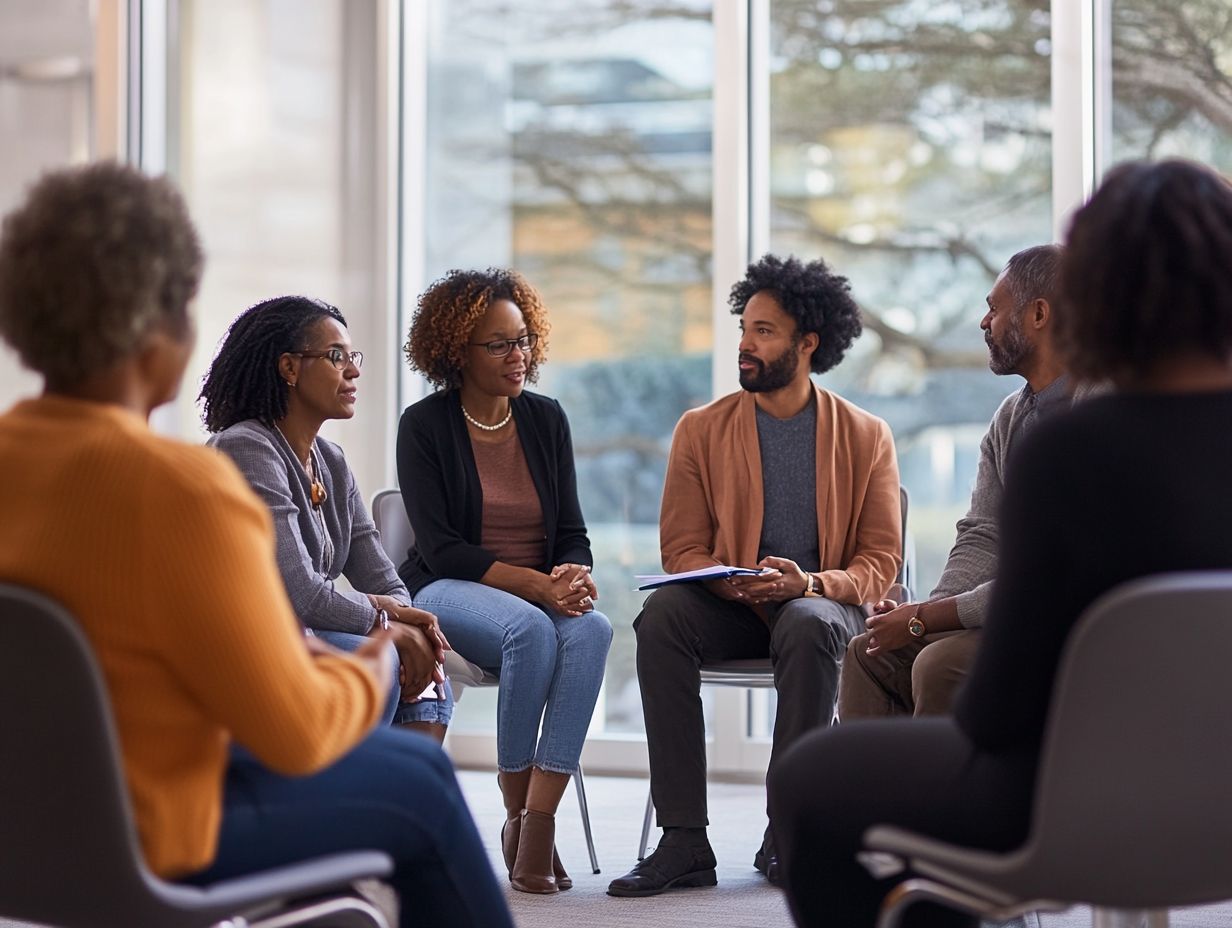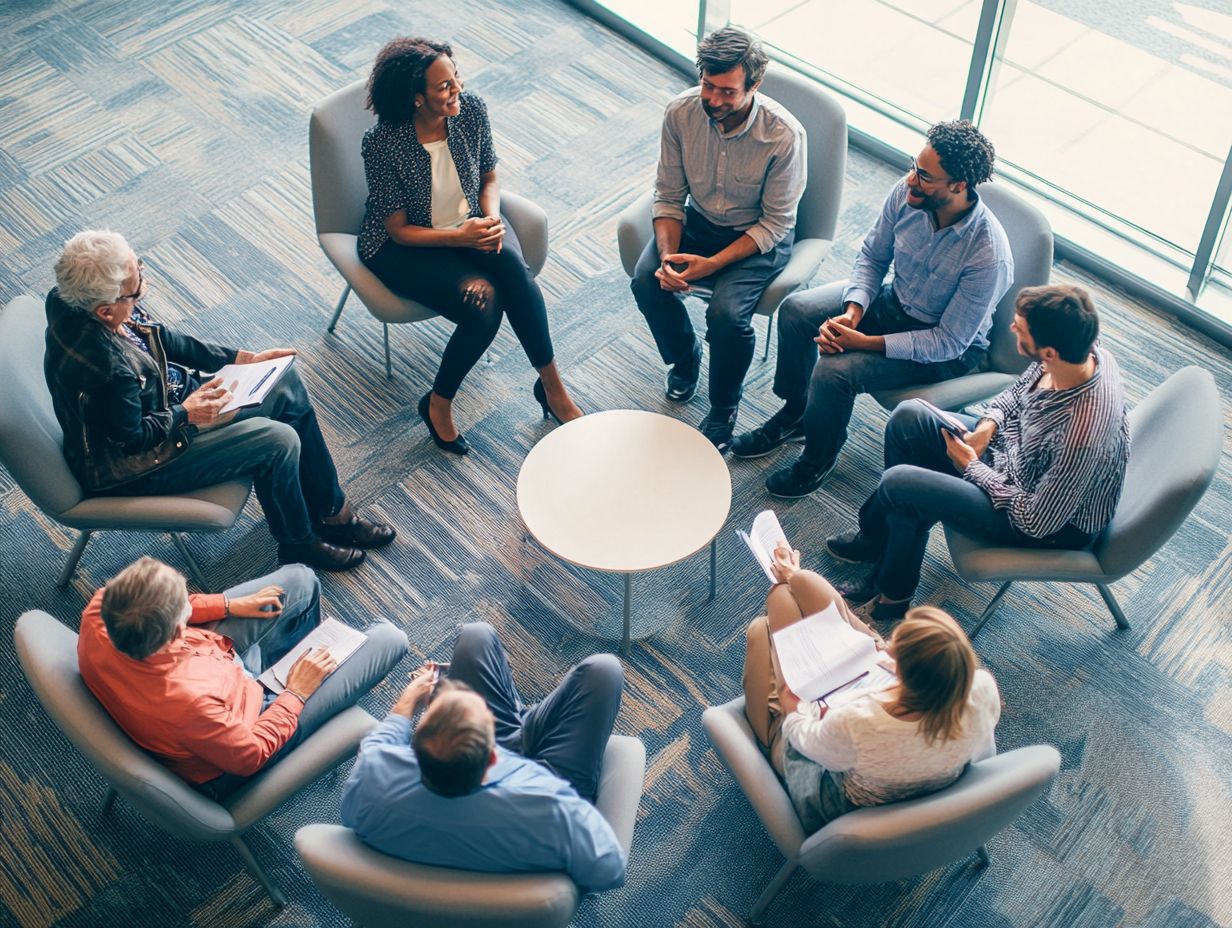Finding support during cancer treatment is crucial for emotional well-being and recovery. “10 Resources for Cancer Patient Networking” explores various platforms where cancer patients can connect with others facing similar challenges. These resources include online support groups, cancer-specific forums, and social media groups that provide essential peer support and foster a sense of belonging.
Additionally, local support groups, survivor networks, and non-profit organizations offer community-based support and resources tailored to specific needs. Hospital-based programs and cancer retreats provide comprehensive care and therapeutic activities that enhance patient well-being.
By engaging in these networking opportunities, cancer patients can access valuable resources, share experiences, and build supportive communities, ultimately transforming their healing journey.
Key Takeaways:
1. Online Support Groups

Online support groups provide essential peer support for individuals undergoing cancer treatment by connecting them with others facing similar experiences and emotions.
These groups facilitate sharing of resources, encouragement, and a sense of belonging, which is crucial for mental health during cancer recovery.
Examples include the Cancer Hope Network and Survivors Sanctuary, which offer spaces for dialogue, support, educational resources, and financial assistance.
Online support groups help patients access crucial information, build relationships, and gain hope, transforming their healing journey.
This optimized version prioritizes direct language, clear semantic triples, and eliminates unnecessary details, making it more suitable for featured snippets.
2. Cancer-Specific Forums
Cancer-specific forums provide online platforms for individuals to discuss specific cancer types, such as breast or prostate cancer.
These forums offer information on diagnosis, treatment options, and personal experiences.
Engagement within these communities helps members share coping strategies and treatment insights.
Cancer-specific forums support individuals by offering shared knowledge and fostering connections with others facing similar challenges.
3. Social Media Groups
Social media groups are online communities where individuals connect to share experiences, raise awareness, and provide peer support within the cancer community.
Social media platforms like Facebook, Twitter, and Instagram facilitate these groups by offering spaces for sharing stories, discussing treatment options, and accessing educational resources.
Social media groups enhance awareness and support among members.
4. Local Support Groups
Local support groups provide community-based support for cancer survivors and those undergoing treatment.
These groups offer a space to share experiences, foster friendships, and help improve emotional well-being.
Participation in local support groups, like ‘Survivors Unite,’ often leads to better mental health by connecting individuals with others who understand their journey.
Workshops and events organized by these groups enable participants to share coping strategies and reduce feelings of isolation during treatment.
5. Cancer Survivor Networks
Cancer survivor networks provide support, resources, and community for individuals who have overcome cancer.
Survivor networks offer safe spaces for sharing experiences and provide access to educational materials on post-cancer care, nutrition, and mental health.
These networks encourage participation in cancer awareness and advocacy to prevent future cases.
6. Non-Profit Organizations
Non-profit organizations dedicated to cancer care provide financial assistance, educational programs, and patient support for those affected by cancer.
These organizations focus on specific cancers like breast, prostate, or lung cancer and tailor services to meet patient needs.
Many offer grants for treatment costs and conduct research to advance understanding of cancer.
Advocacy and information sharing by these organizations promote awareness, early detection, and emotional support for families.
7. Hospital-Based Support Programs

Hospital-based support programs provide comprehensive cancer care by offering medical treatment and emotional support through counseling and educational resources.
Programs like Mayo Clinic’s integrate peer support to connect patients with others who share similar experiences, reducing isolation and anxiety.
These programs enhance patient experience by addressing both psychological and physical well-being during cancer treatment.
8. Cancer Retreats and Camps
Cancer retreats and camps offer therapeutic environments for cancer survivors to relax, find support, and connect with peers who understand their challenges.
Activities at cancer retreats include:
- Yoga
- Meditation
- Art therapy
- Nutrition workshops
These activities enhance well-being and promote healing. These retreats help survivors build supportive networks and foster resilience.
9. Cancer Patient Advocacy Groups
Cancer patient advocacy groups raise awareness about cancer inequalities and enable patients through education and support.
These groups provide information on screening, treatment options, and support services.
Advocacy efforts help patients navigate their cancer journey and encourage community involvement in awareness initiatives.
10. Online Resource Directories
Online resource directories provide cancer resources, including educational materials, financial assistance, and support services.
Directories are organized by cancer type, treatment options, and location, offering quick access to relevant information.
Resources in these directories include clinical trial listings, expert articles, and patient testimonials.
Trusted directories like the American Cancer Society and CancerCare offer credible, easy-to-navigate information for cancer patients and families.
How Can Networking Help Cancer Patients?
Networking helps cancer patients by providing peer support, access to resources, and a community of understanding.
Networking options include:
- Online forums
- Local support groups
- Survivor networks
These networks offer emotional support and practical advice, reducing isolation and improving well-being.
What Are the Benefits of Joining a Support Network?
Joining a support network provides benefits such as improved mental health, access to shared resources, and increased understanding from others with similar experiences.
Support networks offer emotional support, stress reduction, and a sense of community, reducing feelings of isolation.
What Are the Different Types of Cancer Patient Networking?

Cancer patient networking types include online forums, support groups, and survivor networks.
-
Online forums provide anonymity and global communication for sharing experiences.
-
Support groups offer direct interaction and emotional support in a more personal setting.
-
Survivor networks enable patients through shared success stories and mentorship.
Cancer patients can choose based on personal communication preferences and support needs.
How Can One Find a Reliable Support Network?
Finding a reliable support network for cancer patients involves researching reputable organizations, checking credentials, and seeking referrals from healthcare providers.
Verify affiliations with healthcare institutions or cancer organizations to ensure credibility.
Read reviews and testimonials from other patients to gauge the quality of support.
Consulting healthcare providers for recommendations can connect you to trusted networks.
What Are the Common Challenges in Cancer Patient Networking?
Common challenges in cancer patient networking include finding suitable peer support, dealing with isolation, managing emotional stress, and accessing relevant resources.
Patients often face difficulty connecting with others who share similar experiences, which can increase feelings of loneliness.
Support groups provide empathy, shared experiences, and practical advice, helping to overcome these challenges and improve mental health.
How Can One Contribute to the Cancer Support Community?
One can contribute to the cancer support community by volunteering, sharing experiences, and advocating for awareness.
Volunteering involves assisting fundraising events and support programs through local non-profit organizations.
Sharing experiences by joining local support groups or participating in online platforms helps connect emotionally with others.
Advocating for cancer awareness through campaigns and personal stories increases community support and funding for research.
Frequently Asked Questions
What are some resources for cancer patient networking?
1. American Cancer Society’s Cancer Survivors Network (CSN)
2. CancerCare’s Online Support Groups
3. The Leukemia & Lymphoma Society’s Community Support Network
4. The National Coalition for Cancer Survivorship’s My Cancer Circle
5. Cancer Support Community’s MyLifeLine
6. Stupid Cancer’s CancerCon
7. Survivors Sanctuary
8. Cancer Hope Network
9. Endometrial Cancer Action Network
10. Friend for Life
11. Imerman Angels
12. Malecare
13. METAvivor
14. National LGBT Cancer Network
15. SHARE Cancer Support
16. Sisters Network
17. Young Adult Survivors United
18. 4th Angel Mentoring Program
What is the American Cancer Society’s Cancer Survivors Network (CSN)?

The American Cancer Society’s Cancer Survivors Network is an online community for cancer patients, survivors, and caregivers to connect, share experiences, and find support. It offers discussion boards, blogs, personal stories, and resources for those affected by cancer, including information on cancer diagnosis and remission cancer. The network emphasizes the importance of a compassionate listener in the recovery journey.
How can I join an online support group for cancer patients?
One option is to join CancerCare’s Online Support Groups, which provide a safe and supportive space for cancer patients and their loved ones to connect and share experiences. These groups are facilitated by oncology social workers and are available 24/7. Additionally, platforms like Young Adult Survivors United and Imerman Angels offer tailored support for young adult survivors.
What is The Leukemia & Lymphoma Society’s Community Support Network?
The Leukemia & Lymphoma Society’s Community Support Network is an online platform where patients and caregivers can find information, resources, and support for blood cancer. It includes discussion boards, information on clinical trials, and educational resources. The network collaborates with organizations like the National Cancer Institute and Cancer.net to provide comprehensive cancer statistics and data.
How can I connect with other cancer patients in my local area?
You can use The National Coalition for Cancer Survivorship’s My Cancer Circle to connect with other cancer patients in your local area. This online tool allows users to create a private support network and connect with others going through a similar experience. Organizations such as Friend for Life and the National LGBT Cancer Network also offer localized support group options.
What is Cancer Support Community’s MyLifeLine?
Cancer Support Community’s MyLifeLine is a social networking site for cancer patients and their caregivers. It offers a secure and private platform to connect with others, share updates, and find support. It also provides resources for managing the emotional and practical aspects of cancer. Resources are available for various cancer types, including breast cancer, with support from organizations like METAvivor and the Mayo Clinic.
What is CancerCon?
CancerCon is an annual conference organized by Stupid Cancer, a nonprofit organization that empowers young adults affected by cancer. The conference brings together patients, survivors, caregivers, and healthcare professionals for workshops, panel discussions, and networking opportunities. Attendees often include representatives from SHARE Cancer Support, Sisters Network, and the 4th Angel Mentoring Program.








